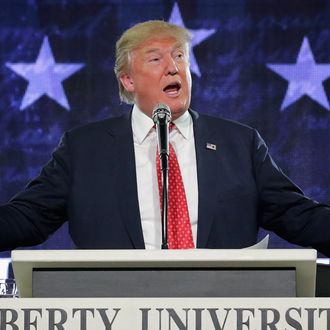
In the fun-house-mirror dynamics of the 2016 presidential contest, one of the more regularly hilarious images is of Donald J. Trump trying to pander to conservative Evangelical Christians.
Back in July at the summer’s preeminent Christian-right event in Iowa, under questioning from Frank Luntz, Trump famously seemed puzzled that anyone would think he needed to ask God’s forgiveness, and deferred instead to the cleansing power of “my little cracker” and “my little wine,” a.k.a., Communion or, as Catholics and some mainline Protestants would call it, the Sacrament of the Holy Eucharist. He rambled through other arguably offensive religious observations (his theological beau ideal, Norman Vincent Peale, is most decidedly not in fashion with any variety of American Christian at present), most of which were submerged in the furor over his disrespecting of John McCain’s war service.
As part of the mainstream media’s confusion over the characteristics of the Trump electorate, there were a few alarms sent up about the Donald’s “base” being Evangelicals, until first Ben Carson and then Ted Cruz came along to challenge his support levels in this demographic. But according to a New York Times/CBS national survey released early last week, Trump remains the leader among Evangelicals, with 42 percent as compared to Ted Cruz’s 25 percent.
Yet he continues to make buffoonish mistakes. Making the obligatory rounds at a Liberty University convocation over the weekend, Trump tried to quote Paul’s Second Letter to the Corinthians, more colloquially referred to as “Second Corinthians.” He called it “Two Corinthians,” showing how little time he’s sat in a pew listening to a Scripture reading. And instead of going to the trouble of negotiating the complicated logic of the Christian right’s position on “religious liberty,” which often seems like compulsory religion to many secular and religious folk alike, Trump cut right to the crudest possible “War on Christmas” chase:
“If I’m president, you’re going to see ‘Merry Christmas’ in department stores, believe me.”
I’m sure the company of saints will cheer.
Still, Liberty president Jerry Falwell Jr. gave Trump a fulsome introduction. And when word leaked out that the tycoon is unveiling an important endorsement in Iowa today, Falwell’s name was the first to surface in speculation before it was displaced by another Christian-right favorite, Sarah Palin.
So how can conservative Evangelicals rationalize their fondness for a man who isn’t even up to the task of pandering to them?
The key to this phenomenon is to understand that the touchstone of the Christian right has always been the semi-divinization of cultural conservatism, and the identification of the Kingdom of God with the patriarchal and puritanical (and sometimes racist) America of the 19th century. So any politician vocally fighting against cultural change, like Donald J. Trump, is objectively a Christian soldier even if he is a religious illiterate and an ethical philistine. This is precisely how conservative Christians have in the past let themselves be recruited into the camps of other highly secular demagogues, from the proto-fascists of the 1930s to the church-y and Bible-quoting segregationists of the civil-rights era.
To their credit, most conservative Evangelical leaders seem to dislike Trump for reasons ranging from his personal ethics to his hateful attitudes toward immigrants; Southern Baptist spokesman Russell Moore has issued repeated jeremiads warning the faithful against this false prophet. It may well be that Trump’s Evangelical following is mostly not that observant. But so long as religious leaders and their political allies treat cultural change as demonic, and people different from them as Satan’s spawn, then they cannot plead complete innocence when their flocks follow the loudest voice of protest and ask for little other than lip service to faith itself.






























